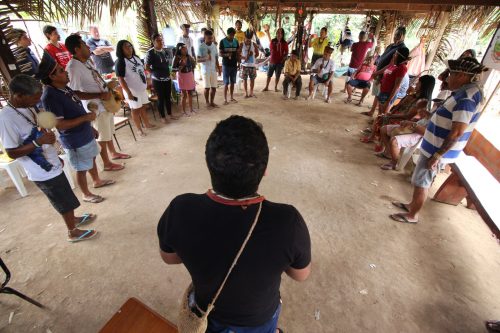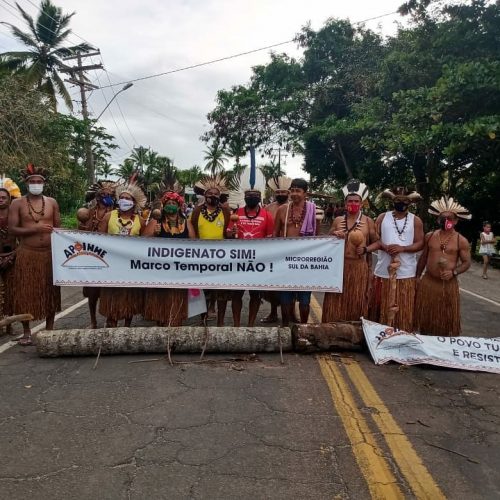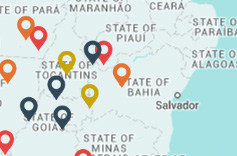Since 2007, the organisation, Representation of Indigenous People and Organisations in the Northeast, Minas Gerais and Espírito Santo (APOINME) has had a Department of Indigenous Women within the structure of the organisation. The purpose of the space is to give a voice to these women in their territories, increase the scope of their understanding about the violations facing their peoples and, of course, to seek means of overcoming these violations, particularly those that directly affect women.
 With a view to strengthening the movement, the women of APOINME sought support from Brazil Fund. The project Territory, Tradition and Resistance: Indigenous Women in the East and Northeast is one of the initiatives receiving support through the Resistance programme.
With a view to strengthening the movement, the women of APOINME sought support from Brazil Fund. The project Territory, Tradition and Resistance: Indigenous Women in the East and Northeast is one of the initiatives receiving support through the Resistance programme.
This line of support by Brazil Fund aims to strengthen the work of groups, collectives and civil society organisations in defending human rights, so they are able to resist growing violations in the current political scenario. Through its support to the women at APOINME, Brazil Fund is seeking to encourage leadership in defending the territorial and cultural rights of these peoples who are under threat due to the scenario of attacks and the dismantling of the indigenous rights that are guaranteed by the 1988 Constitution.
“This is a way for the women to use their voices to show that they have their own issues which need to be taken into account. It is also a way of saying that we are present as the movement progresses”, explains Elisa Urbano, coordinator of the Department of Indigenous Women at APOINME.
Work is currently focused on structuring and strengthening the group. On the list of political tasks is training for the coordinators, selecting representatives for each sub-region where the organisation is present and training a committee to write the action plan.
“Brazil Fund´s contribution to our women´s movement is of huge importance because we feel that APOINME receives support from several sources, but the articulation of women does not receive the same attention. We feel the need to write a booklet with the guidelines of our work. This support will spark off other actions. It could be said that our work started in the field”, says Elisa Urbano.
The project promotes ongoing instruction, qualification and political training for representatives of the Committee for the Indigenous Women of the East and Northeast of Pernambuco. A meeting is being held from 27 to 30 September, within the framework of the project, in the Xucuru-Kariri territory, in Palmeira dos Índios, Alagoas.
The strength of the indigenous women as APOINME progresses
Women have always had a fundamental role in defending indigenous land and lives within the Representation of Indigenous People and Organisations in the Northeast, Minas Gerais and Espírito Santo (APOINME), but until recently, their struggle was indirect or even invisible.
Maninha Xukuru-Kariri was uncomfortable with this and she was the first and only woman for much of the 1990s, to participate in the running of APOINME. The activist led struggles and helped to build renewal throughout the Northeast.
“APOINME is mainly composed of men. As an organisational institution it would not have the visibility that makes it stand out at a national level, if it weren´t for the great feminine leaders who have been a part of it and who continue to participate in the story of the struggle”, explains the coordinator of the Department of Women at APOINME.
Maninha died in October 2006 and as a legacy, months after her death, the Department of Women at APOINME was born.
“Without a doubt, Etelvina Celestina, our Maninha Xukuru-Kariri, was an icon, not only for her contribution in the organisation to women reaching the scope they have but mainly for the part she played in APOINME occupying the position it does today”, recalls Elisa Urbano.
It was Maninha´s approach that led to the agenda of women being part of the indigenous debate within the organisation. “APOINME was not giving visibility to women´s issues as a specific theme. But Maninha got noticed for her participation and potential in the struggle, mainly because she was a woman”, said Elisa.
The creation of APOINME
In the 1970s, the movements for the struggle for indigenous rights saw an upsurge in Brazil. It was in this decade that, through confrontation with settlers, the indigenous people became politically aware and intensified their struggle for the right to land, language, customs and their lives.
 And then the 1980s became particularly significant for the indigenous movement in Brazil, as this was a time when leadership among indigenous movements soared, making their actions and mobilisations more visible.
And then the 1980s became particularly significant for the indigenous movement in Brazil, as this was a time when leadership among indigenous movements soared, making their actions and mobilisations more visible.
On this backdrop, the indigenous people of the northeast also stood up to fight as a social movement. The first was UNI-Nordeste, created in 1985, then the East-Northeast Commission, of the Pataxó Hãhãhãe indigenous territory, in Itabuna, Bahia. In 1990, it was officially named the Representation of Indigenous People and Organisations in the North-East, Minas Gerais and Espírito Santo (APOINME). Although still unofficial, their objective was to articulate leadership in the region for the defence of indigenous rights, human rights and principally territorial rights.
“APOINME was institutionalised in March 1995, as a civil, non-profit association for the fight to recover traditional indigenous territories and claim specific public policies for the education, health, development and sustainability of the indigenous peoples, together with public authorities”, the coordinator of the Department for Indigenous Women at APOINME told us.
Area of activity
APOINME is a body for political leadership training, whose spaces stem from daily life in the villages, passing through internal organisations for the articulation of the peoples together with the state, at the state, national and even international levels.
The headquarters are in Olinda in Pernambuco, but their scope includes grassroots organisations from other states too, such as Alagoas, Bahia, Paraíba, Piauí, Rio Grande do Norte, Sergipe, Minas Gerais and Espírito Santo. In terms of population, it represents over 78 peoples and more than 213 thousand indigenous people.
“Each state is represented through its leadership, who are denominated coordinators of sub-regions, on our organogram”, says Elisa.
In order to hear and reach the indigenous people they support, the sub-regions elect a representative for each people, so communication and articulation can be as swift as possible. The main demand, among those raised, is the defence of land, given the history of conflicts and invasions of indigenous territories, in which communities have been expelled and until today live with a trail of violence.
“When our leadership is in the presence of public authorities, claiming our rights, we always stress the issue of land as the most important one. And then we widen the discussion to health, education and sustainability in these territories, as well as environmental management. Our lands represent our families, our lives”, says Elisa Urbano.
APOINME has been the inspiration for the creation of other organisations at the state level as well as among the peoples. Particularly, for example, in the state of Pernambuco, the organisation sits on boards and committees where the representation of indigenous peoples is guaranteed.






